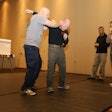People have their own opinions about what makes a good cop and what constitutes a successful law enforcement career. Most people agree that moving up the ranks is a good indicator of success. For those of you who are looking to add some stripes to your uniform, here’s some advice from people who have been there.
Traits of Success
Having a positive attitude is probably the most important component of a successful career in law enforcement. Something can always happen to put you in a bad mood, just like at any other job. But dealing with low-life criminals every day is a unique aspect of policing that can wear on a person. It helps to remember that not every person on the street is a criminal.
“Just because the last person you stopped was a jerk doesn’t mean you have to come down hard on the next guy. He might be a nice fellow who made an honest mistake,” says Roy Huntington, who retired as a sergeant from the San Diego Police Department after more than 20 years of service.
Other people on the job will no doubt appreciate a positive outlook, as well as a willingness to take on whatever tasks need to be handled.
In fact, Chuck Mader, deputy chief of police at the Bloomingdale (Ill.) Police Department, attributes his success in moving up the ranks to having a positive attitude and being at the right place at the right time.
“The only thing you can control is yourself,” says Mader. “Units can be cut, you can be re-assigned, but the biggest most important key is to never stop being the best cop you can be, no matter where your assignments take you.”
And sometimes doing your best could mean knowing when not to voice complaints. Sgt. Mark Stainbrook of the Los Angeles Police Department has learned this the hard way. He says that working within the system is often the best way to get the job done, especially when you’re at lower ranks.
“Sometimes, as a more astute police officer, you may have to work within boundaries that somewhat limit you, despite your capabilities. The key is to display leadership where you can and to make the world around you a better place,” says Stainbrook.
Integrity is very important in establishing and maintaining a successful career, adds Mader. “Realize that the only true thing of value that you have throughout your career is your word,” he says. “Be what you represent, regardless of your rank, unit of assignment, or educational level.”
Mader suggests that you should also be careful of the company you keep. By surrounding yourself with people who want to be good cops, some of their positive attitude will rub off on you.
With a tough job like policing, it’s not difficult to cultivate a negative attitude if every get-together with other officers becomes a chance to denounce management, or criminals, or society in general.
After 28 years in law enforcement, Lt. Dave Spaulding of the Montgomery County (Ohio) Sheriff’s Office knows this all too well. “Rotating shifts, inner-office politics, union issues, and so many other things can easily contribute to a negative attitude,” Spaulding says. “It is so important to keep these things in the locker room and focus on the task we signed on for...protecting and serving the public.”
While discussion about legitimate grievances certainly has its place, focusing only on what is wrong with the world won’t get the job done. And it certainly won’t cast you in a good light in the eyes of management.
Moving Up the Ranks
If you’ve made a conscious decision to advance in law enforcement, it helps not only to exhibit the traits of a competent leader, but to also learn all you can about the job.
Make a conscious decision about how to handle office politics. Some swear that you need to play the game to get ahead, while others say they’ve done better by avoiding politics altogether. Base your decision on your department and on what you know about yourself. While you may have a problem hanging out with people just because you think they will help your career, try networking with people you think you could learn from.
Cultivate relationships that will be beneficial to you. It may sound like a calculated plan, and it is, but it is one that can benefit both you and the officer who mentors you.
Stainbrook says he’s found that mentorship is a worthwhile endeavor, although it’s sometimes difficult to begin and maintain.
“Making contacts is easy, but keeping up with them is the hard part,” he says. “If you want to become a homicide detective, for example, seek out one who is open to helping you over the long term. What schools did she attend? What was her career track? What does she feel you must do in order to achieve your goals? What would she do differently?”
Stainbrook also advocates taking an active role in learning from your mentor, not just asking questions and shadowing him or her on the job. “Volunteer, even if it is on your free time, to assist with cases or to help on any projects,” he suggests.
However, remember that no one is perfect, advises Chief Paul Walters of the Santa Ana (Calif.) Police Department. “Model yourself after someone you admire while recognizing that person’s weaknesses as well as your own and make a plan to improve,” he says.
Walters also warns that it’s easy to latch on to a mentor because you have similar philosophies. While this can be a good thing, it might prevent you from growing as a police officer and a person.
“Do not shut out opposing points of view and make sure to listen without being defensive,” he cautions.
Don’t limit yourself by looking to only one person for mentorship. Look at those around you and learn from them, as well.
In his years on the San Diego PD Huntington didn’t have a particular mentor, but he looked to others for guidance.
“I relied on what I saw from a wide range of experienced (and inexperienced) officers, friends, and citizens. I took what seemed to work for them and used it, eventually blending a wide cross-section of ideas into a way of policing that seemed to work well for me.”
Once you’ve been on the job a while, why not be a mentor yourself? You might learn something along the way, and it will help you to better keep in touch with the way younger officers are approaching the job, which can come in handy when you’re in a management position.
Don’t stagnate in a position for too long if you want to move ahead, advises Stainbrook.
“Get experiences in as many areas as possible and if you particularly like one, become a subject matter expert in that field. Whether it is gangs, drugs, firearms, accident investigation, or some other field, your expertise will make you valuable to your department, unit, or section.”
Remember to include training as part of the learning essential to advance in your job. If you don’t have the necessary training, you won’t have the expertise to do the job, or manage others doing the same type of work.
“Kick and scream if you have to, but have your department send you to as much training as possible,” urges Stainbrook. “Be creative. Some training is free, or you can latch onto another agency’s training for little or no money. In some cases, consider paying for the training yourself. The payback can be exponential.”
Also think about furthering your education as part of your training and preparation for higher-level jobs. You can often get grants and scholarships or reimbursements from your agency. There’s usually some kind of financial help available if the degree you’re pursuing can be applied to your job.
Degrees can provide a means to advance professionally at a department, says Commander Molly Bernard of the Boulder (Colo.) Police Department.
“Many times degrees are necessary for a promotion,” says Bernard. “And they often also provide other opportunities for career development.”
Whatever you do, learn as much as you can from each assignment.
Staying on Track
Don’t forget the principles of career success once you’ve reached a certain rank. Anyone can tell you that a chief or sheriff who has stopped caring about other people is not making any friends, which can make it hard for officers to believe in their leader. And it doesn’t set a good example for others.
As chief of the Fort Lupton (Colo.) Police Department, Gerald Garner believes in being firm but fair, something he has established as a life-long goal for himself.
“I believe that giving an ear to all sides and earnestly trying not to show favoritism is helpful to my present career as a chief of police. I also believe that honestly trying to lead by example is helpful to me and to any chief,” says Garner. Mader’s greatest concern is maintaining a good relationship with staff.
“Don’t forget where you came from. Don’t ask anyone to do what you can’t do. Remember, cops are ordinary people thrown into extraordinary circumstances,” advises Mader.
Maintaining good relationships with everyone you work with and doing your best at your job are goals that are best maintained over time, no matter your station in life.

















